Finding the Storytelling Tools at Work in a Game: Music in The Witcher 2
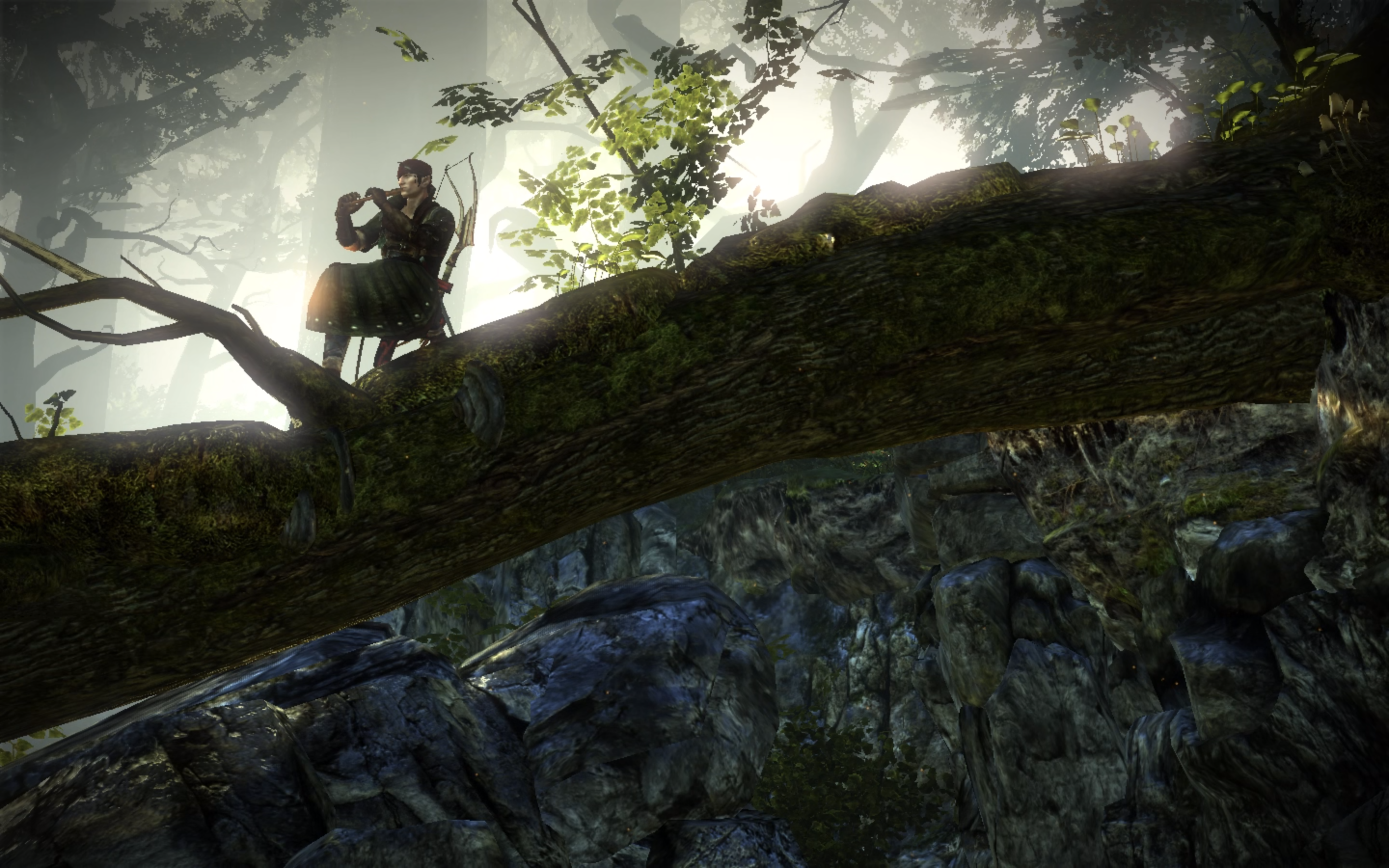
November 7, 2024
This analysis stems from a valuable assignment in The Narrative Department's Game Writing Masterclass II which challenged us to explore how different facets of a game intersect to support the storytelling. I've developed and expanded on my original thoughts to explore how the physical environment, musical elements, and gameplay mechanics help to support the core story and flesh out its characters.
Writing - and all it encompasses in this weird and wonderful medium - is just one tool in a game's storytelling belt. Like environmental design, which I covered before here, music is another powerful vehicle for feeding hungry players a hearty dollop o' story. While I'm sadly nowhere near musically literate enough to talk at length about The Witcher 2's (incredible) score itself, I'm going to unpick one particular moment in which music is centred as part of the story itself, and why I think it's so profound.
Music: Meeting Iorveth
At the beginning of Act I we - as the player-character Geralt, a witcher; a slayer of monsters - trudge through a forest towards the port town of Flotsam, on the hunt for the Temerian king's assassin. Accompanied by two allies, the sorcereress Triss Merigold and Temerian Special Forces leader Vernon Roche, we make our way through the weeds and trees - and, before long, we hear a sound.
"Hear that?" Geralt asks.
"I smell an elf," Roche replies.
The sound of a lone recorder playing a wistful tune fills the dell, growing louder as we approach its source. We turn a corner and see the silhouette of a figure in the weak, early-day sunlight: a male elf, sat playing the instrument on a great, fallen tree trunk above, seemingly unperturbed by our arrival. As the game clicks into a cutscene, it's our turn to be perturbed. The elven warrior - we now realise he's armed and wearing armour - doesn't hurry to stop on our account. Our group looks to one another as he takes his time to finish playing the final notes.
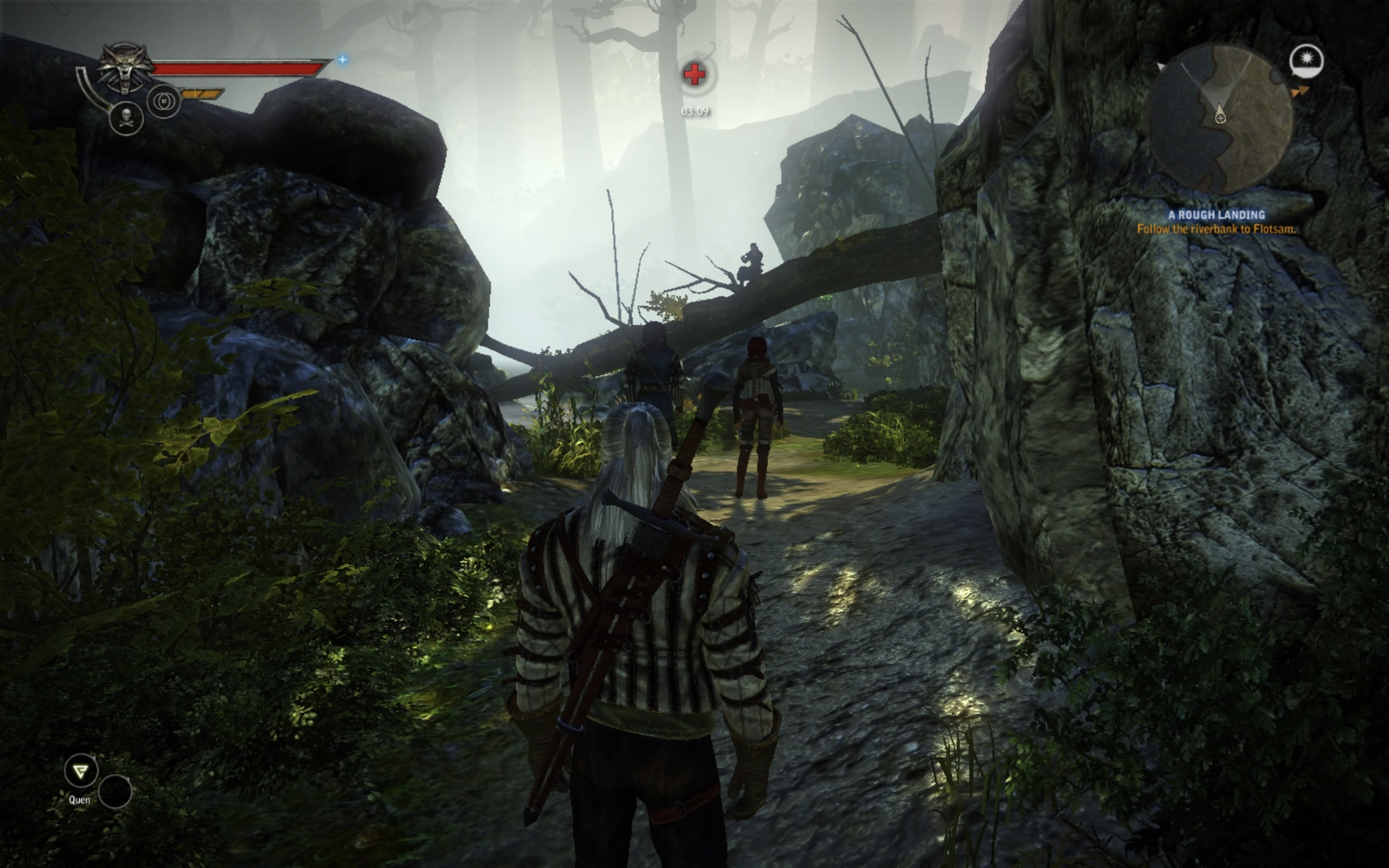
"Vernon Roche!" the elf then shouts as he stands, bellowing at the Temerian soldier from his vantage point. He knows exactly who has just wandered into 'his' territory, as well as how much elven and dwarven blood Roche has on his hands as the leader of the nonhuman-suppressing Blue Stripes unit. Roche shouts something far less sophisticated back, informing us in the process that this figure is Iorveth: an infamous elven freedom fighter who has plenty of human scalps to his own name.
An exchange between our group and Iorveth quickly becomes violent as the game begins to centre one of its central narrative themes: the enduring, roiling conflict between humans and nonhumans. It's in sharp contrast to the beauty and poignancy of the tune that filled the forest air only moments before - and which set the perfect stage for this vital story beat.
The piece of music that Iorveth plays is actually a real-life composition called 'Stella Splendens' ('Splendid Star' in Latin) from a medieval manuscript called the Llibre Vermell de Montserrat, though in the game it's heavily implied to be an old elven tune.
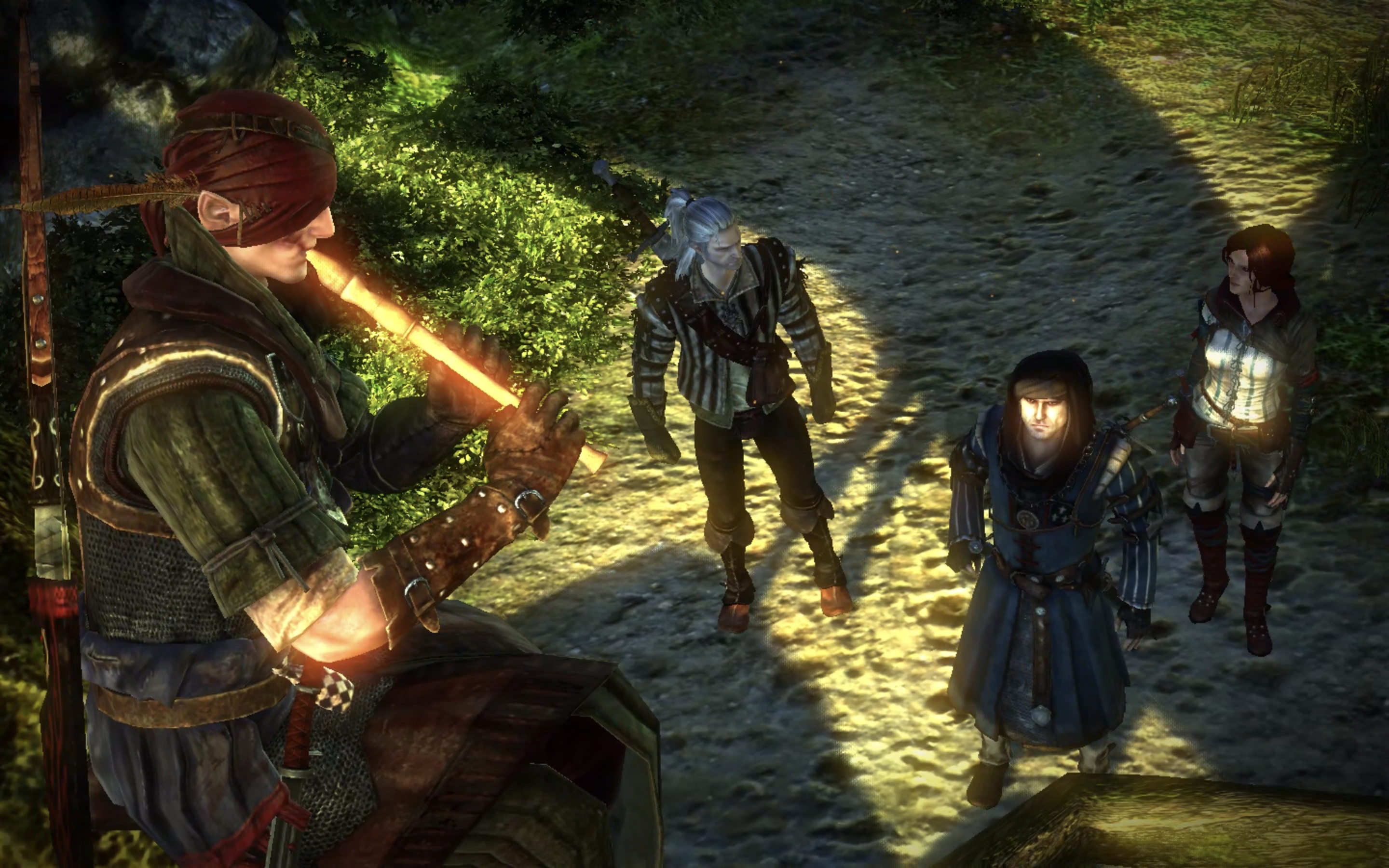
Iorveth's decision to play it at this moment - and to continue it until he's finished despite human enemies' presence - underpins the game's storytelling in powerful ways. Primarily, because the tune is both deeply poignant and threatening at the same time.
Iorveth uses the sound of the recorder, which is out of place in a forest humming with the sounds of birds, insects, and the rush of river water, as a dramatic flourish: a warning shot across Geralt and his crew's bows as they transgress boundaries into 'his' territory. Humans, who are systematically suppressing the existence of elves and dwarves across the game's world, may dominate the nearby town of Flotsam and monopolise its flow of wealth and resource, but the forest belongs to him and his unit of nonhuman freedom fighters, the Scoia'tael. Everybody knows it: Triss and Roche have a half-finished conversation about it as they stomp through the forest, only seconds before they hear the sound of the recorder.
The music Iorveth plays is in one sense a signal that there are Scoia'tael ahead. He seems to be marking his territory, using a medium that very clearly represents his elven kind: music; art; beauty. As Triss later remarks, "elves possess a sensitivity that humans can't ever hope to acquire". When he has finished the last few notes - drawn his line in the sand, in his elven 'language', so to speak - Iorveth follows through on this threat. He stows his instrument to then verbally threaten the group before ordering his unit to attack, prompted by either Triss' or Roche's actions (depending on a QTE choice, Triss will attempt to capture Iorveth using aggressive magic or Roche will yell "Enough of this piss!" and chuck a dagger at him).
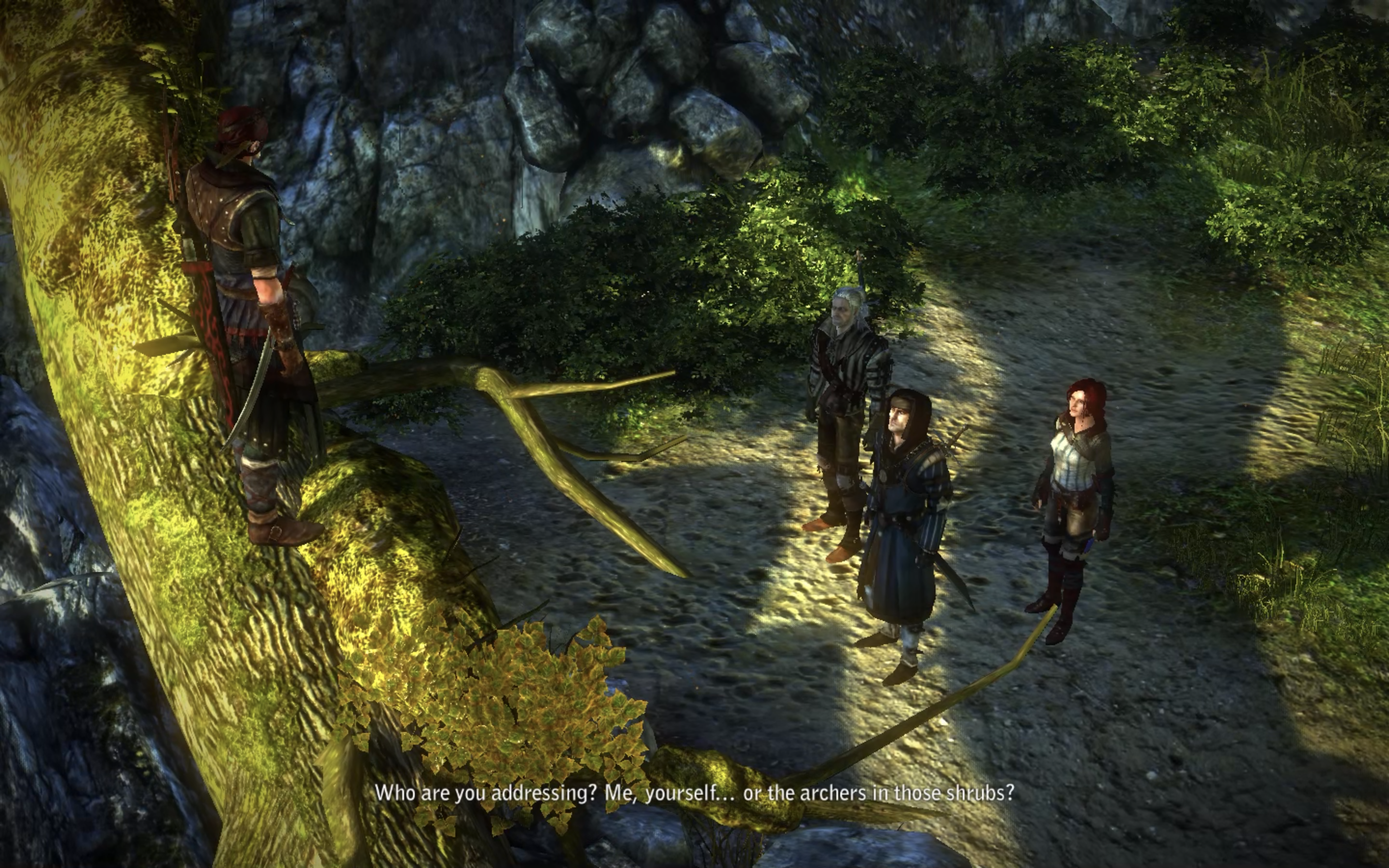
This musical storytelling is used to communicate a threat before the beat snowballs into a violent fracas from which the player-character and co. must escape, and in doing so lays the groundwork for the human-v-nonhuman conflict that'll come to form one of the game's central narrative pillars. It's explicitly telegraphed in the game's opening title cards. It will underpin the biggest choices of Act I. It'll see the world physically shift and change in consequence. Therefore, it's also a signal to us of the violent fallout to come, in which our Geralt must make a choice and become complicit, and find a way to live with it.
But there's another dimension, too, which only strengthens this storytelling. The tune is sad and beautiful, especially as played solo on a humble wooden recorder. The beauty of the song Iorveth plays helps the player to feel a pang of sympathy for him and his elven kin, despite their positioning at this point in the game's arc as antagonists. It’s a wistful tune that seems to communicate some sense of loss and longing, played by a lone figure fighting unceasingly for his kind, who are dying out in a world of human dominance and violence.
If we later come to choose Iorveth over Roche as our ally, we get to hear from him just how deeply this wound cuts. How much the humans outnumber them. How Roche once cut down Iorveth's unit "to the last elf". How depressingly pragmatic his approach to fighting for nonhumans' future has had to become in the face of reality. How futile fighting for that future might really be, even if individual battles may be won along the way.
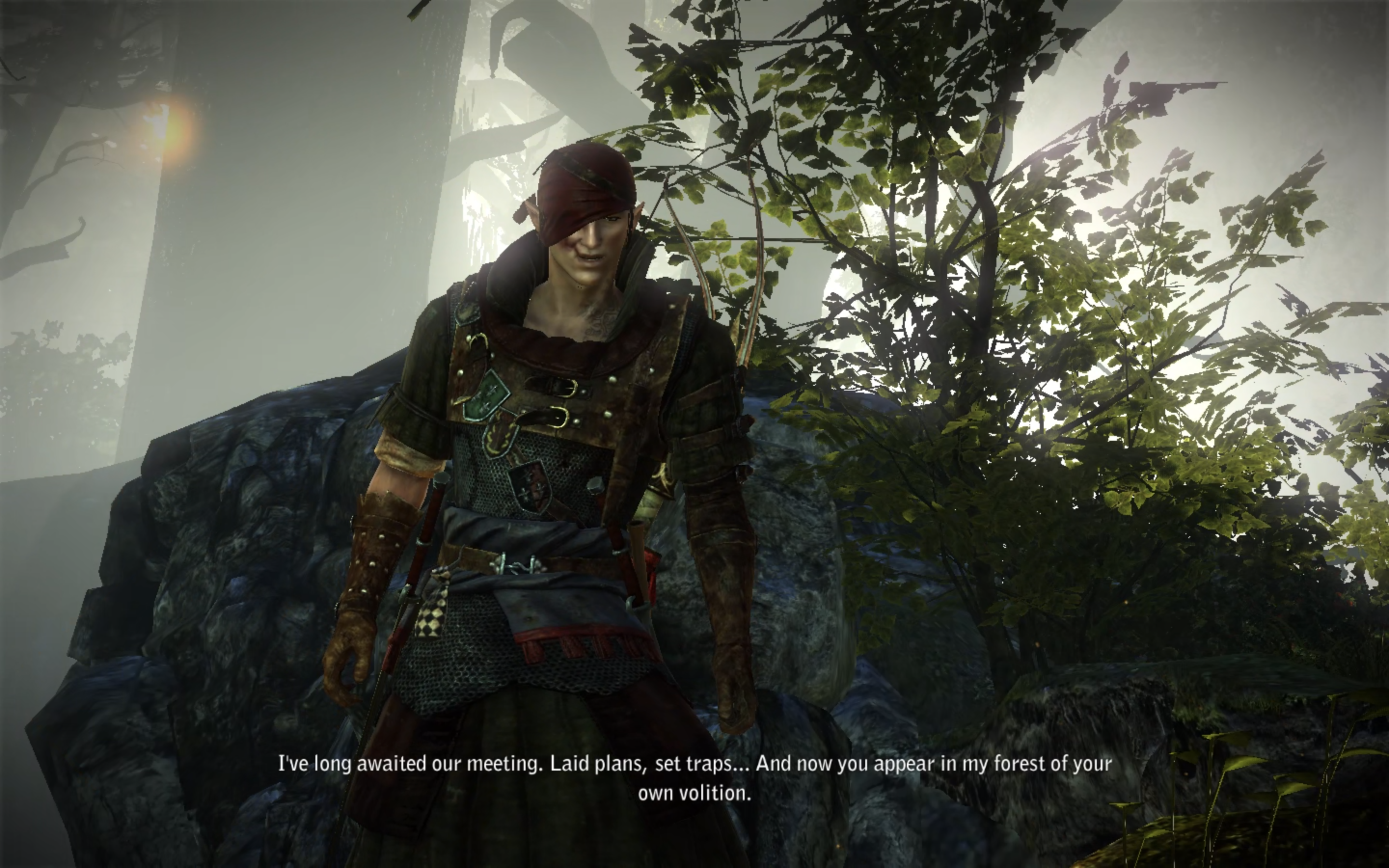
But, crucially, we also have to first get to this point. In fact, we have to be able to even reach a place in which we could consider choosing Iorveth as an ally over Roche, the man who helped our Geralt escape prison despite his seemingly clear guilt over the death of Roche's beloved King Foltest.
Moments such as Iorveth's recorder-playing help to communicate to us the validity of the 'other' side - of the beauty and distress and loss there. They crystallise something about these characters and who they are in a way that only music really can. They tug at our heartstrings a little through a medium that has immense power to do that - to evoke strong feelings that words may not always be able to express as fully in the moment. This musical moment, then, helps to lay another kind of groundwork: one which allows us to warm to Iorveth in a shorter space of time than we have with Roche, and allow us to feel - if just for a few seconds - some of what he and his kind may be feeling.
This scene's use of music does double duty both as a warning and a kind of lament for what’s being lost - and will continue to be lost - which is in itself a potential justification for why Iorveth is sending the warning in the first place. The game doesn’t let you turn and run from the signal - it’s a linear story path. But it could be interpreted as a warning - a single chance for the vulnerable human traveller to turn back when they hear it. A sign of the Scoia'tael's desire to hold onto the beauty and peace that once defined their elven kind, which somehow survives, however frayed and bloodied it may now be.